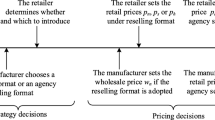Abstract
This paper studies how online referral affects the brand market management and investigates the spillover conditions from national brand to store brand market. We develop the game models without and with online referral, and derive the equilibrium strategies under the uniform pricing strategy and the differential pricing strategy. The results show that as the brand awareness increases, the presence of online referral would reduce the national brand’s selling price, market demand and profit, and raise the store brand’s selling price and market demand. Moreover, the differential pricing strategy could be better for the store brand than the uniform pricing strategy. Under the differential pricing strategy, the infomediary decides a higher referral commission only when the brand awareness is lower. In addition, the results also demonstrate that as the brand awareness increases, the spillover condition would be reduced under the differential pricing strategy and show a first declining and then rising trend under the uniform pricing strategy. To mitigate the spillover effect, the national brand should reduce the consumer’s search cost in the national brand market.








Similar content being viewed by others
References
Branco F, Sun M, Villas-Boas JM (2012) Optimal search for product information. Manag Sci 58(11):2037–2056
Branco F, Sun M, Villas-Boas J (2016) Too much information? Information provision and search costs. Mark Sci 35(4):605–618
Cachon GP, Terwiesch C, Xu Y (2008) On the effects of consumer search and firm entry in a multiproduct competitive market. Mark Sci 27(3):461–473
Cai G, Chen Y (2011) In-store referrals on the internet. J Retail 87(4):563–578
Cao Z, Zhao J, Zhang C, Min J, Zhou Y (2015) Pricing and channel structure selecting under brand competition and channel competition. J Syst Eng 30(1):104–114
Chambolle C, Christin C, Meunier G (2015) Optimal production channel for private labels: Too much or too little innovation? J Econ Manag Strategy 24(2):348–368
Chen H, Yan Y, Liu Z, Xing T (2018) Effect of risk attitude on outsourcing leadership preferences with demand uncertainty. Soft Comput 22(16):5263–5278
Chen Y, Zhang T (2011) Equilibrium price dispersion with heterogeneous searchers. Int J Ind Organ 29(6):645–654
Chen Y, Lyer G, Padmanabhan V (2002) Referral infomediaries. Mark Sci 21(4):412–434
Chen Y, Zhang W, Yang S et al (2014) Referral service and customer incentive in online retail supply chain. J Appl Res Technol 12(2):261–269
Chen Y, Yang S, Wang Z (2016) Service cooperation and marketing strategies of infomediary and online retailer with eWOM effect. Inf Technol Manag 17(2):109–118
Cheng R, Ma W, Ke H (2018) How does store-brand introduction affect a supply chain with uncertain information? J Intell Fuzzy Syst 34(1):189–201
Gao J, Yang X, Liu D (2017) Uncertain shapley value of coalitional game with application to supply chain alliance. Appl Soft Comput 56(1):551–556
Ghose A, Mukhopadhyay T, Rajan U (2007) The impact of internet referral services on a supply chain. Inf Syst Res 18(3):300–319
Hann IH, Terwiesch C (2003) Measuring the frictional costs of online transactions: the case of a name-your-own-price channel. Manag Sci 49(11):1563–1579
Jin Y, Wu X, Hu Q (2017) Interaction between channel strategy and store brand decisions. Eur J Oper Res 256(3):911–923
Ke H, Wu Y, Huang H (2018) Competitive pricing and remanufacturing problem in an uncertain closed-loop supply chain with risk-sensitive retailers. Asia Pac J Oper Res 35(1):1–21
Liu B (2007) Uncertainty theory, 2nd edn. Springer, Berlin
Luo Z, Chen X, Chen J, Wang X (2017) Optimal pricing policies for differentiated brands under different supply chain power structures. Eur J Oper Res 259(2):437–451
Mantin B, Krishnan H, Dhar T (2014) The strategic role of third-party marketplaces in retailing. Prod Oper Manag 23(11):1937–1949
Ru J, Shi R, Zhang J (2015) Does a store brand always hurt the manufacturer of a competing national brand? Prod Oper Manag 24(2):272–286
Ryan J, Sun D, Zhao X (2012) Competition and coordination in online marketplaces. Prod Oper Manag 21(6):997–1014
Su P, Liu S, Lin J (2017) Agglomeration effect and the “dual-format” e-marketplace pricing scheme. J Model Manag 12(1):19–35
Tang W, Zhou C, Xiao C, Zhao R (2016) Equilibrium search model with endogenous growth rate of human capital. Kybernetika 52(6):866–897
Wang C, Leng M, Liang L (2018) Choosing an online retail channel for a manufacturer: Direct sales or consignment? Int J Prod Econ 195(1):338–358
Weber T, Zheng Z (2007) A model of search intermediaries and paid referrals. Inf Syst Res 18(4):414–436
Wu H, Cai GG, Chen J, Sheu C (2015) Online manufacturer referral to heterogeneous retailers. Prod Oper Manag 24(11):1768–1782
Yang L, Ji J, Chen K (2018) Advertising games on national brand and store brand in a dual-channel supply chain. J Ind Manag Optim 14(1):105–134
Zhang J (2016) The benefits of consumer rebates: a strategy for gray market deterrence. Eur J Oper Res 251(2):509–521
Zhang J, Liu Z, Rao R (2018a) Flirting with the enemy: online competitor referral and entry-deterrence. Quant Mark Econ 16(2):209–249
Zhang M, Zhang J, Cheng T et al (2018) Why and how do branders sell new products on flash sale platforms? Eur J Oper Res 270:337–351. https://doi.org/10.1016/j.ejor.2018.02.051
Zhou C, Tang W, Zhao R (2015a) Optimal consumer search with prospect utility in hybrid uncertain environment. J Uncertain Anal Appl 3(6):1–20
Zhou C, Tang W, Zhao R (2015b) Optimal stopping for dynamic recruitment problem with probabilistic loss of candidates. Seq Anal 34(2):187–210
Zhou C, Tang W, Zhao R (2017a) Optimal consumption with reference-dependent preferences in on-the-job search and savings. J Ind Manag Optim 13(1):503–527
Zhou C, Tang W, Zhao R (2017b) An uncertain search model for recruitment problem with enterprise performance. J Intell Manuf 28(3):695–704
Zhou J (2011) Ordered search in differentiated markets. Int J Ind Organ 29(2):253–262
Acknowledgements
This work is supported by Humanity and Social Science Youth Foundation of Ministry of Education of China (No. 17YJC630232), National Natural Science Foundation of China (No. 71702129), Tianjin Municipal Science and Technology Project (18ZLZXZF00380), China Postdoctoral Science Foundation (No. 2017M610160) and Yanta Scholars Foundation of Xi’an University of Finance and Economics.
Author information
Authors and Affiliations
Corresponding authors
Ethics declarations
Conflict of interest
All authors have no conflict of interest.
Human and animal rights
This article does not contain any studies with human participants or animals performed by any of the authors.
Additional information
Communicated by Y. Ni.
Publisher's Note
Springer Nature remains neutral with regard to jurisdictional claims in published maps and institutional affiliations.
Rights and permissions
About this article
Cite this article
Zhou, C., Ma, N., Cui, X. et al. The impact of online referral on brand market strategies with consumer search and spillover effect. Soft Comput 24, 2551–2565 (2020). https://doi.org/10.1007/s00500-018-3661-4
Published:
Issue Date:
DOI: https://doi.org/10.1007/s00500-018-3661-4




